
The Communist Party of China (CPC), commonly known as the Chinese Communist Party (CCP), is the founding and sole governing political party of the People's Republic of China (PRC). The CCP leads eight other legally permitted subordinate minor parties together as the United Front. The CCP was founded in 1921, mainly by Chen Duxiu and Li Dazhao, with the help of the Far Eastern Bureau of the Communist Party of the Soviet Union and Far Eastern Secretariat of the Communist International. The party grew quickly, and by 1949 the Kuomintang (KMT)'s Nationalist Government had been driven from mainland China to Taiwan after the Chinese Civil War, leading to the establishment of the People's Republic of China on 1 October 1949.
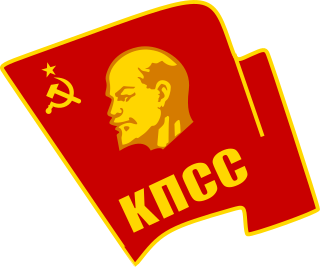
The Communist Party of the Soviet Union (CPSU), sometimes referred to as the Soviet Communist Party (SCP), was the founding and ruling political party of the Soviet Union. The CPSU was the sole governing party of the Soviet Union until 1990 when the Congress of People's Deputies modified Article 6 of the 1977 Soviet Constitution, which had previously granted the CPSU a monopoly over the political system.

The United States Congress is the bicameral legislature of the federal government of the United States and consists of the House of Representatives and the Senate. The Congress meets in the United States Capitol in Washington, D.C. Both senators and representatives are chosen through direct election, though vacancies in the Senate may be filled by a governor's appointment. Congress has 535 voting members: 100 senators and 435 representatives. The Vice President of the United States has a vote in the Senate only when senators are evenly divided; the House of Representatives has six non-voting members.

The speaker of the United States House of Representatives, commonly known as the speaker of the House, is the presiding officer of the United States House of Representatives. The office was established in 1789 by Article I, Section 2 of the U.S. Constitution. The speaker is the political and parliamentary leader of the House of Representatives and is simultaneously the House's presiding officer, de facto leader of the body's majority party, and the institution's administrative head. Speakers also perform various other administrative and procedural functions. Given these several roles and responsibilities, the speaker usually does not personally preside over debates. That duty is instead delegated to members of the House from the majority party. Neither does the speaker regularly participate in floor debates.
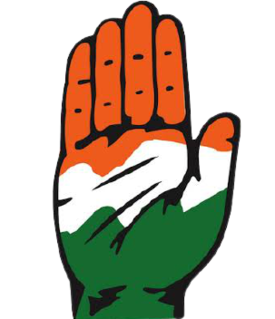
The Indian National Congress is a political party in India with widespread roots. Founded in 1885, it was the first modern nationalist movement to emerge in the British Empire in Asia and Africa. From the late 19th century, and especially after 1920, under the leadership of Mahatma Gandhi, Congress became the principal leader of the Indian independence movement. Congress led India to independence from the United Kingdom, and powerfully influenced other anti-colonial nationalist movements in the British Empire.
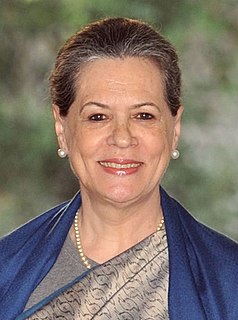
Sonia Gandhi is an Indian politician. She is the president of the Indian National Congress, a big tent political party, which has governed India for most of its post-independence history. She took over as the party leader in 1998, seven years after the assassination of Rajiv Gandhi, her husband and a former Prime Minister of India, and remained in office until 2017 after serving for twenty-two years. She returned to the post in 2019 after her son, Rahul Gandhi, resigned.

The Communist International (Comintern), also known as the Third International, was an international organization founded in 1919 that advocated world communism, controlled by the Soviet Union. The Comintern resolved at its Second Congress to "struggle by all available means, including armed force, for the overthrow of the international bourgeoisie and the creation of an international Soviet republic as a transition stage to the complete abolition of the state". The Comintern was preceded by the 1916 dissolution of the Second International.

The Nepali Congress is the largest social-democratic political party in Nepal. Presently, it is the ruling party since July 2021. The Nepali Congress remains the largest party of Nepal by popular votes and membership.
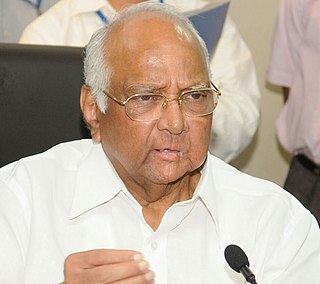
Sharad Govindrao Pawar is an Indian politician with over sixty years of public service. He holds a position of prominence in Indian politics as well as in the regional politics of Maharashtra. During his long career, Pawar has served as the Chief Minister of Maharashtra on three occasions and held the posts of Minister of Defence and Minister of Agriculture in the Government of India. He is president of the Nationalist Congress Party (NCP), which he founded in 1999, after separating from the Indian National Congress. He leads the NCP delegation in the Rajya Sabha, the upper chamber of the Indian parliament. He is one of the founders of Maha Vikas Aghadi, a post-poll alliance in Maharashtra between Shivsena, NCP, and INC.
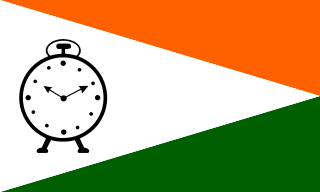
The Nationalist Congress Party is one of the eight national parties in India.

The Communist Party of India (Marxist) is a communist political party in India. It is one of the national parties of India. The party emerged from a split from the Communist Party of India in 1964. The CPI(M) was formed in Calcutta from 31 October to 7 November 1964.

The Communist Party of India is the oldest communist political party in India, one of the eight national parties in the country. The CPI was formed on 26 December 1925 at Kanpur.
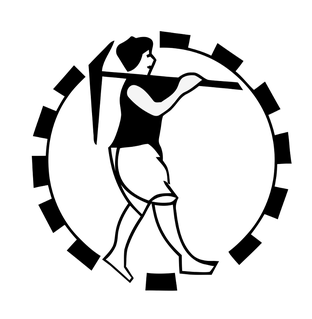
The Janata Party was a political party that was founded as an amalgam of Indian political parties opposed to the Emergency that was imposed between 1975 to 1977 by Prime Minister Indira Gandhi of the Indian National Congress. In the 1977 general election, the party defeated the Congress and Janata leader Morarji Desai became the first non-Congress prime minister in independent modern India's history.

The All India Trinamool Congress is an Indian political party which is predominantly active in West Bengal. The party is led by chief minister of West Bengal Mamata Banerjee, who has led the state since 2011. Following the 2019 general election, it is currently the fourth-largest party in the Lok Sabha with 22 seats.

The United States House of Representatives is the lower house of the United States Congress, with the Senate being the upper house. Together they compose the national bicameral legislature of the United States.

The United States Senate is the upper chamber of the United States Congress, with the House of Representatives being the lower chamber. Together they compose the national bicameral legislature of the United States.

The Yuvajana Sramika Rythu Congress Party is an Indian regional political party based in the state of Andhra Pradesh. Its founder and president Y. S. Jagan Mohan Reddy serves as the state's chief minister. Since the 2019 general election, the YSRCP has been the joint-fourth largest party in the Lok Sabha with 22 seats.

The National People's Congress of the People's Republic of China, normally referred to as the National People's Congress, is the highest organ of state power and the national legislature of the People's Republic of China. With 2,980 members in 2018, it is the largest parliamentary body in the world. The National People's Congress meets in full session for roughly two weeks each year and votes on important pieces of legislation. Members are considered to be part-time legislators and are not paid.



















